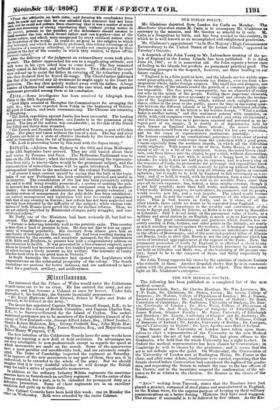ottlt. IONIAN etaiac:r.
Mr. Gladstone departed from London for Corfu. on. Monday. Ther Mancheater Guardian states M. Caita is to accompany Mr. Gladstone tm secretary to the mission, and Mr. Gordon as attache to it only. M. Caita is a Neapolitan by birth, and has long resided in this country, in which he is well known as an accomplished and enlightened gentleman.
Mr. Gladstone's appointment "to be Her Majesty's High Commissionen Extraordinary to the United States of the Ionian Islands," appeared in Tuesday's Gazette.
A despatch of Sir John Young to Mr. Labonehere treating of the po- licy of England in the Ionian Islands has been published. It is date4 June 10, 1857 so it somewhat old. Sir John reports a better state, of feeling in the islands but predicts no permanent practical good. The interesting passages in the despatch, however, are those bearing on mg future conduct.
"England is in a false position here and the islands are too widely sepae rated geographically, and their interests too distinct, ever toe form a mogemous whole, under foreign auspices. The small size and distance, one from the other, of the islands render the growth of a common public opin- ion impossible. The free press, consequently, has no character of reality nor echo in the minds of the people. Failing these important elementa, there does not exist the power necessary to control and elevate the tenden- cies of the Legislative A.ssembly, winch, without such enlightened gui- dance, either in the press or the public, passes its time in diecussing quar- rels between the different islands or in the pursuit of iedividual interest& Napoleon says in one of his letters to his brother Joseph,. "What a nation hates is another nation," and this sentiment poisons with suspicion, ox chills with cold reception every benefit we confer and every advancement and if this dictum be true as to provinces acquired and governed as an in- tegral part of an empire it is doubly. so of dependencies held by mu& tenure as England' holds these islands ; the sooner therefore she extricates herself from the position the better for her own reputation. and for the CallS8 of representative institutions generally. . . . The Ionians complain of no constitutional grievance—of no abuse of power on our part. England could retire from the protection with a good grace. I mean especially from the southern islands, in which all the difficulties"
really originate. With respect to one of them, '
Santa Maura it is not an island at all—it is a bit of the continent. Gl ivas, the noted Greek chief- tain, rode from Greece into the citadel, to pay a visit, without dismounting, some weeks ago. To part with it would be a happy boon to the other islands ; for while it does not half pay its expenses, and is a heavy clog on the resources of Corfu, its pretensions for patronage and expenditure know no limits. As to Corfu, it could scarcely be given up without bad faith; for its possession by Greece would keep all Albania and Epirus in constant agitation ; but it ought to be held by England in full sovereignty as a co- lony; and if so held, it would, with its dependencies, form a most valuable and beautiful possession. Corfu, as well as its satellite Paxo, more than pays all its own expenses ; has, indeed, a large surplus revenue though it is not half peopled ; more than half waste, uudrained, and, neglected, Under really British auspices its agriculture, its commerce and its people3
would receive new life, and '
a vast impulse. The island would become a garden and and its port the centre of the commerce of the adjacent coun- tries. This is well known in Corfu, and in it alone, of all the other islands, there exists no desire to be separated from England. . • . . Corfu is of as great importance to the security and convenience of the route to Egypt and India, by Trieste, as Malta is to the route by Marseilles or Gibraltar. Still I do not insist on the paramount value of Corfu, as n military and naval station in an English, so much as in an European point of view. The great establishments and garrisons which Austria has re- cently erected at Pole, Cattaro, and other points in the Adriatic, are nearly as much standing menaces against the western, as Sebastopol was against the eastern provinces of Turkey; and the constant interference of Austria in the affairs of Montenegro, and of the semi-independent tribes of Albania and Bosnia, tends to show that Russia is not the only neighbour which haa views of territorial aggrandizement at the expense of the Porte. Now, the permanent possession of Corfu by England is as effectual a check to any projects of conquest of the neighbouring Turkish provinces by Austria as our hold on Gibraltar and Malta was, at the beginning of the present cane tury, found to be to the conquest of Spain and Sicily respectively by France."
Sir John Young supports his views by the opinions of eminent Ionians" who coincide in them. Another despatch shows that he is in commune cation with the present Government on the subject. This throws some light on Mr. Gladstone's enterprise.


























 Previous page
Previous page